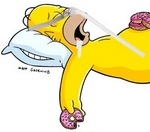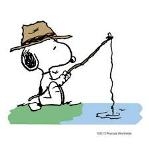First, a bit of background. I was diagnosed with sleep apnea in 2011. The sleep study showed an AHI of 30, RDI of 75, Sleep Efficiency of 72 and Low Oxygen Level of 91. A pressure of 12 was determined to be optimal. I tried on and off for a couple of years to adapt to CPAP including several different masks but was not successful. The biggest problem was the constant attention during the night dealing with a leaking mask probably exacerbated because of my constant tossing and turning plus being a side and stomach sleeper. I purchased one of the anti-snoring mouth guards and fooled myself into thinking that would be sufficient.
Now back to the present. About three weeks ago I spent three days in the hospital due to atrial fibrillation (A-fib). This is the third episode of A-fib, each of which occurred while I was asleep. The first two incidents went undiagnosed because I reverted back to normal rhythm before seeking medical help. The cardiologist believes that the episodes of A-fib are being caused by the sleep apnea.
While in the hospital I slept sitting up in the bed and noticed that I was not constantly tossing and turning. When I returned home I dug the CPAP machine and mask out of storage and moved a recliner into my bedroom. So far sleeping in the recliner I have been able to adapt to the CPAP much better than when I was sleeping in a bed and have been able to keep the mask on all night with a minimum number of adjustments. The biggest issue is a sore nose caused by the mask. I have also been able to recline almost flat in the recliner and sleep on my back with the CPAP mask on. I was never comfortable sleeping on my back in a regular bed.
My post hospital visit with a pulmonologist was a week ago and she is prescribing a nasal pillows mask and a chin strap to keep my jaw from dropping. I will be going back in about seven weeks to follow up and see if any changes need to be made to my pressure and if I am adapting OK to the nasal pillows. I am still dealing with the insurance bureaucracy in obtaining the new equipment. My machine says my current AHI is 11 and periodic breathing is 1%. Maybe the new mask will help decrease my AHI to a better level. If not, then I suspect an increase in pressure at my next visit with the doctor.
So, I would be curios in hearing if others may have experienced A-fib due to untreated sleep apnea. And if CPAP therapy prevented future incidents from occurring. Does anyone else find that sleeping in a recliner is preferable to sleeping in a bed?
Returning to CPAP after episode of Atrial Fibrillation
Returning to CPAP after episode of Atrial Fibrillation
_________________
| Machine: DreamStation CPAP Machine |
| Mask: Amara View Full Face CPAP Mask with Headgear |
| Humidifier: DreamStation Heated Humidifier |
- Wulfman...
- Posts: 6688
- Joined: Mon Sep 01, 2014 6:41 pm
- Location: Nearest fishing spot
Re: Returning to CPAP after episode of Atrial Fibrillation
A link to a forum search on "Afib":
viewtopic/t110750/search.php?keywords=Afib
Lots of people, lots of discussions. And, "yes", they're connected/related.
Many folks have used their recliners or inclined beds to help become accustomed to this therapy.
Den
.
viewtopic/t110750/search.php?keywords=Afib
Lots of people, lots of discussions. And, "yes", they're connected/related.
Many folks have used their recliners or inclined beds to help become accustomed to this therapy.
Den
.
(5) REMstar Autos w/C-Flex & (6) REMstar Pro 2 CPAPs w/C-Flex - Pressure Setting = 14 cm.
"Passover" Humidification - ResMed Ultra Mirage FF - Encore Pro w/Card Reader & MyEncore software - Chiroflow pillow
User since 05/14/05
"Passover" Humidification - ResMed Ultra Mirage FF - Encore Pro w/Card Reader & MyEncore software - Chiroflow pillow
User since 05/14/05
- GettingBetter
- Posts: 371
- Joined: Thu Dec 03, 2015 5:08 pm
Re: Returning to CPAP after episode of Atrial Fibrillation
Hi RIchArt,richart wrote:First, a bit of background. I was diagnosed with sleep apnea in 2011. The sleep study showed an AHI of 30, RDI of 75, Sleep Efficiency of 72 and Low Oxygen Level of 91. A pressure of 12 was determined to be optimal. I tried on and off for a couple of years to adapt to CPAP including several different masks but was not successful. The biggest problem was the constant attention during the night dealing with a leaking mask probably exacerbated because of my constant tossing and turning plus being a side and stomach sleeper. I purchased one of the anti-snoring mouth guards and fooled myself into thinking that would be sufficient.
Now back to the present. About three weeks ago I spent three days in the hospital due to atrial fibrillation (A-fib). This is the third episode of A-fib, each of which occurred while I was asleep. The first two incidents went undiagnosed because I reverted back to normal rhythm before seeking medical help. The cardiologist believes that the episodes of A-fib are being caused by the sleep apnea.
While in the hospital I slept sitting up in the bed and noticed that I was not constantly tossing and turning. When I returned home I dug the CPAP machine and mask out of storage and moved a recliner into my bedroom. So far sleeping in the recliner I have been able to adapt to the CPAP much better than when I was sleeping in a bed and have been able to keep the mask on all night with a minimum number of adjustments. The biggest issue is a sore nose caused by the mask. I have also been able to recline almost flat in the recliner and sleep on my back with the CPAP mask on. I was never comfortable sleeping on my back in a regular bed.
My post hospital visit with a pulmonologist was a week ago and she is prescribing a nasal pillows mask and a chin strap to keep my jaw from dropping. I will be going back in about seven weeks to follow up and see if any changes need to be made to my pressure and if I am adapting OK to the nasal pillows. I am still dealing with the insurance bureaucracy in obtaining the new equipment. My machine says my current AHI is 11 and periodic breathing is 1%. Maybe the new mask will help decrease my AHI to a better level. If not, then I suspect an increase in pressure at my next visit with the doctor.
So, I would be curios in hearing if others may have experienced A-fib due to untreated sleep apnea. And if CPAP therapy prevented future incidents from occurring. Does anyone else find that sleeping in a recliner is preferable to sleeping in a bed?
Really happy you are posting. Very proud you drug that CPAP machine out of storage. Never too late to take care of yourself. I hope this continues to work for you.
I'm reposting Den's list because there is a lot of information that can help on AFib.
viewtopic/t110750/search.php?keywords=Afib
Hope to read more, good news of course!
Kind regards,
GB










